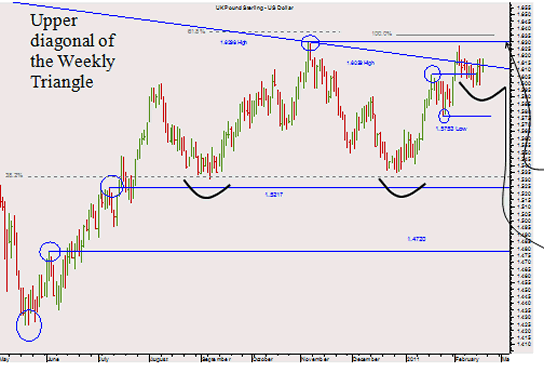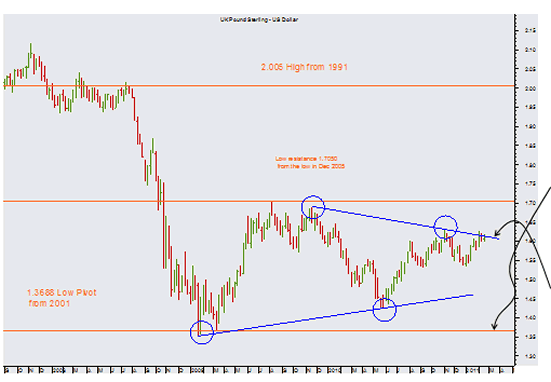British Pound is Poised
Currencies / British Pound Feb 18, 2011 - 06:35 AM GMTBy: Seven_Days_Ahead
 The Bank of England quarterly inflation report released yesterday had been anticipated by market players as the starting signal for the Bank to begin hiking interest rates sometime in the next few months.
The Bank of England quarterly inflation report released yesterday had been anticipated by market players as the starting signal for the Bank to begin hiking interest rates sometime in the next few months.
The Technical Trader’s view:
|
WEEKLY CHART Triangles can be bottoms as well as Tops. This is all the more likely in this case since the market is bouncing from an already established low from 2001. Bulls need to watch the price action at the Upper diagonal carefully.
|
 |
DAILY CHART The rally so far from the lows has been characterized by the importance of Fibonacci levels and Prior Highs. The hesitation at the 1.6298 Prior High Pivot as well as at the gently falling Triangle diagonal. But note too the support from the relatively minor Prior High at 1.6059 – preventing the market from falling back further. The cluster of Fibonacci extensions above 1.6298 may be a problem, but on balance we are cautious Sterling bulls - waiting for confirmation of a break through 1.64. |
The Macro Trader’s view:
The Bank of England quarterly inflation report released yesterday had been anticipated by market players as the starting signal for the Bank to begin hiking interest rates sometime in the next few months.
The inflation outlook short term showed a higher peak than the November forecast before dropping back, based on the Short Sterling futures strip’s forecast of rising interest rates. But Bank Governor King seemed to do his best at the press conference to dampen expectations of higher interest rates in the immediate future.
His defence of the Bank’s record and policy stance rests on the impact external shocks have had on inflation. In a nut shell he argued that domestic price and wage pressures are subdued, but it was rising world energy, commodity and food costs that were responsible for pushing up inflation and were exaggerated by the Pound’s 20% devaluation during the financial crisis/recession.
He further argued that to react now to current inflation by hiking interest rates would be wrong, since once these “one off” shocks had worked through the statistics, inflation would fall to target, so a series of hikes now would likely cause an inflation undershoot relative to the 2.0% target.
But just how many on the MPC share his view?
Only today MPC member Andrew Sentence argued that the window for gradual policy adjustment might be closing, meaning a more aggressive series of rate hikes might be needed eventually. So despite King’s laboured attempt at yesterday’s press conference to quell expectations of tighter policy, it is clear there are many conflicting views among policy makers. In fairness, King did admit this.
Although Short Sterling interest rate futures traders reacted by reducing their bets on the likelihood of a near term rate hike, foreign exchange traders seem to take a different view. After a brief period of weakness yesterday, the Pound has recovered against the Dollar and to a lesser degree the Euro, which suggests Cable traders still expect interest rates to rise sooner rather than later.
Are they right?
King based his argument on the recent external price increases representing one-off shocks. But looking at commodity markets, those price rises could extend further. The demand created for raw materials, energy and food by the economies of China and India, together with other larger emerging economies, could conceivably drive those prices higher yet.
Indeed, if the US economy is truly recovering towards something like its own growth potential, demand for key raw materials and energy will increase, further driving up costs. Will the Bank simply stand idly by and say there is nothing we can do as inflation pushes ever higher?
King argued yesterday that to have kept inflation at target, the recession would have been deeper. So what policy makers have done is spread the pain of reduced living standards across the economy, through rising inflation, rather than concentrate it in a smaller group by pushing up unemployment through higher interest rates.
But they may need to do that anyway if external inflation continues to rise. Paradoxically, foreign exchange traders are betting on that outcome as they push the Pound higher against the Dollar. Ironically, if the Pound goes far enough, it might just help choke off imported inflation and the need for rate rises! But that is a long way off.
In the meantime, can the Pound rally further on expectations of rates rising sooner rather than later? We think it can, but the move is likely to be volatile.
Mark Sturdy
John Lewis
Seven Days Ahead
Be sure to sign up for and receive these articles automatically at Market Updates
Mark Sturdy, John Lewis & Philip Allwright, write exclusively for Seven Days Ahead a regulated financial advisor selling professional-level techni44cal and macro analysis and high-performing trade recommendations with detailed risk control for banks, hedge funds, and expert private investors around the world. Check out our subscriptions.
© 2011 Copyright Seven Days Ahead - All Rights Reserved
Disclaimer: The above is a matter of opinion provided for general information purposes only and is not intended as investment advice. Information and analysis above are derived from sources and utilising methods believed to be reliable, but we cannot accept responsibility for any losses you may incur as a result of this analysis. Individuals should consult with their personal financial advisors.
Seven Days Ahead Archive |
© 2005-2022 http://www.MarketOracle.co.uk - The Market Oracle is a FREE Daily Financial Markets Analysis & Forecasting online publication.




